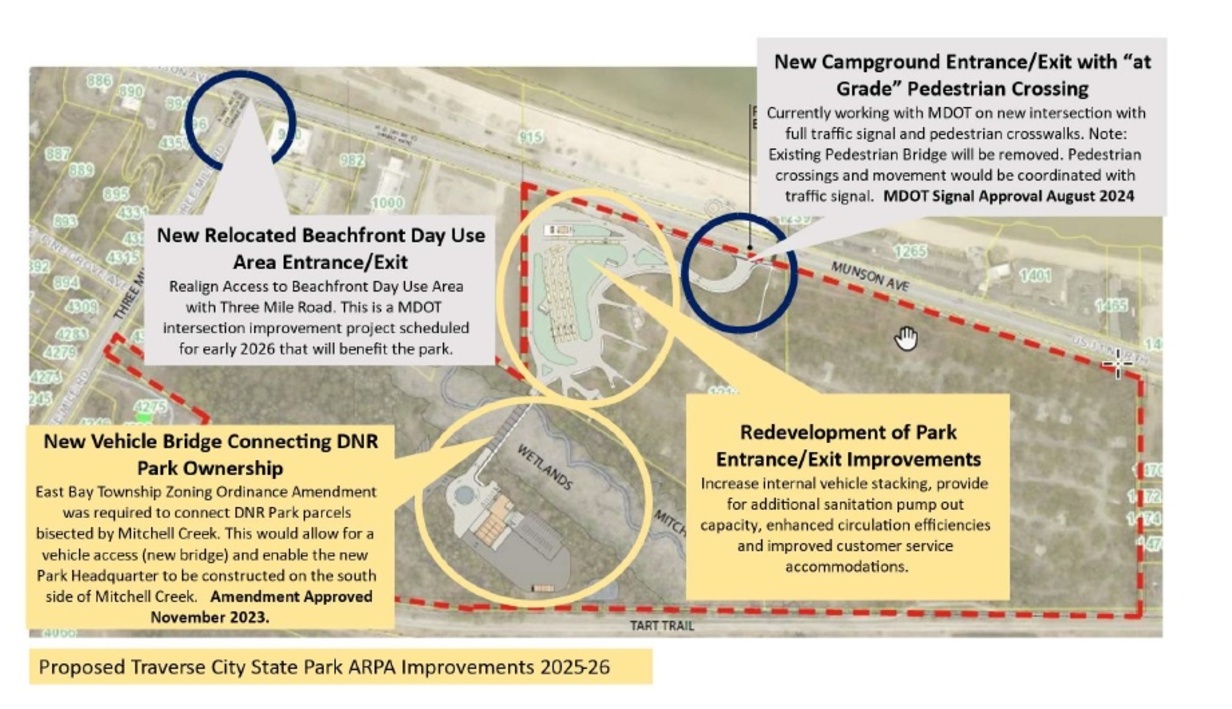
TC State Park to Close Next July Through 2026; Improvements to Include New Signalized Entrance, Pedestrian Bridge Removal, New HQ & Park Amenities
By Beth Milligan | Nov. 5, 2024
Approximately $8.5 million in “transformational” improvements are coming to the Keith J. Charters Traverse City State Park, which will close immediately after the National Cherry Festival next year for the rest of the 2025 and 2026 seasons for construction work. The project – funded by American Rescue Plan Act (ARPA) dollars – will include removing the pedestrian bridge over US-31 and creating a new park entrance with a traffic signal and pedestrian crosswalks, tearing down the lodge and building new park headquarters, and improving the park’s sanitation pump-out capacity, internal traffic circulation, and customer service areas. The Three Mile Road/US-31 intersection will also be reconstructed during the park’s closure.
The Traverse City State Park, one of Michigan’s busiest campgrounds with 348 modern campsites, is set to close July 7, 2025 and will not reopen until the 2027 camping season. Several major projects are set to commence in the park – the result of feedback from hundreds of residents and campground users when the Michigan Department of Natural Resources (DNR) created the park’s first-ever management plan in 2021.
Chief among those improvements is moving the park’s entrance/exit east down US-31 and installing a new traffic signal at the relocated entrance. The DNR undertook a traffic study that showed a signal was warranted at the new location, with the Michigan Department of Transportation (MDOT) agreeing and giving the DNR permission to proceed with installing a new light. Due to sight lines with the traffic signal, the DNR will also remove the pedestrian bridge over US-31. That bridge – which is deteriorating and not ADA-compliant – is nearing the end of its useful life and accruing costly maintenance expenses, according to the DNR.
The traffic signal will offer at-grade signalized pedestrian crossings timed with the lights – a more “sustainable” long-term option for getting park users safely across the highway to the beach, says DNR Regional Field Planner Annamarie Bauer. While logistics of the bridge removal are ultimately up to the DNR (which controls the bridge) and its contractor, the project is likely to affect traffic on the MDOT highway underneath. MDOT North Region Communications Specialist James Lake says some type of US-31 closure will likely be required, though he notes bridges elsewhere in the state – including those larger than TC’s pedestrian bridge – have been removed during just one or two overnight closures.
The new entrance will provide a more “parklike” environment for campers entering the site, as well as improved stacking room for vehicles, Bauer says. The entrance drive will lead up to a new campground office and contact station, which will offer walkup customer service for check-ins, firewood and ice sales, and “drive-thru convenience,” according to Bauer. The park’s pump-out capacity will also be doubled and moved to the campground’s perimeter to avoid traffic backups. The Traverse City State Park “is about the worst in the state for the number of campsites served by sanitation,” Bauer says, explaining pump-out ports will be expanded from two to four.
The park’s lodge will be demolished to accommodate the new improvements. An estimated nine campsites near the entrance will also be impacted. However, Bauer says DNR staff are looking at other areas to add in more campsites to try and keep the overall total as close as possible to the park’s existing capacity.
The DNR will relocate the park’s headquarters to a 29-acre parcel south of Mitchell Creek between the creek and the TART Trail. A zoning amendment approved by East Bay Township last year will allow the DNR to build a new bridge over Mitchell Creek, connecting the two parcels now bisected by the creek. While the creek itself is narrow, the surrounding watershed is “fairly wide,” says Bauer – requiring an estimated 200-foot-long timber bridge to span the wetland. The crossing will “basically move our park operations from the front entrance to those back acres,” Bauer says, including the HQ offices and several maintenance bays. The new bridge could offer future opportunities to develop more amenities on the back parcel, such as new hiking trails and campsites – though those improvements are not part of the 2025-26 project, Bauer notes.
MDOT and the DNR are collaborating on another major project during the work period: the reconstruction of the Three Mile/US-31 intersection. The MDOT-led project will align the Traverse City State Park beach entrance with the intersection, add a second westbound left-turn lane from US-31 onto Three Mile Road, and make significant pedestrian safety improvements including new sidewalks, ramps, signals, and crosswalk markings. Fixing the beach entrance – which is currently west of the intersection, causing traffic conflicts as visitors attempt to enter or exit the park – was the top desired improvement identified by respondents when the Traverse City State Park management plan was created.
Lake says the intersection project is planned for early 2026. “We’re hoping to get started as soon as the weather allows, so March or April, and get it wrapped up before the Fourth of July,” he says. The Traverse City State Park beach and day-use area is planned to remain open during park construction over the next two years, though occasional closures may be required for intersection or other work.
The Traverse City State Park redesign marks the second major state park update locally following the closure of Interlochen State Park this year for water/sewer upgrades and other improvements. According to the DNR’s website, the toilet building at that park will remain closed until mid-April, with the modern campgrounds set to reopen by May 15. The $3.6 million Interlochen State Park project is also ARPA-funded. The primary reason why Michigan residents and visitors are seeing so many major park and campground projects happening at once across the state is that the influx of federal ARPA funding also comes with deadlines – most crucially, an end-of-2026 cutoff to spend all funds. Bauer says the funding will allow projects at the Traverse City State Park and elsewhere – some of which have been in the planning stages for years – to at last get completed.
“We’re finally here, and it’s exciting,” she says. “It’ll be an inconvenience while we’re closed, but hopefully it will be worth it in the long run, because it’ll be transformational.”
Photo credit: Michigan DNR
Comment






